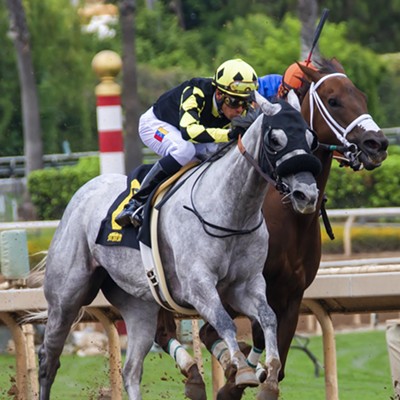Animal House
Charlotte Metro Zoo has been cited over a dozen times by the USDA. Critics wonder why it's still open.
By Sam BoykinIn 1998, two lions from the zoo, which were being used as entertainment at Renaissance festivals, mauled a man as he was cleaning their cage. The victim was flown by helicopter to a trauma center where he was treated for wounds to his head, leg, and face.
In October 2000, Animal Control officials had to assist Macaluso in a search for a leopard cub and a tiger cub after Macaluso lost control of his vehicle and crashed while returning from a photo shoot with the animals.
Despite these infractions, escapes, injuries and incidents, the zoo continues to operate. Macaluso insists he's been unfairly persecuted and falsely portrayed, and that his zoo is a safe and dignified habitat for animals that provides entertainment and education to the public. An estimated 15,000 people visited his zoo last year.
Smaller "roadside zoos" like Charlotte Metro Zoo are increasingly finding themselves the target of animal welfare advocates, who say these smaller outfits don't have the money or resources to adequately care for the animals, especially when compared to attractions like the NC Zoological Park in Asheboro. The Asheboro zoo is one of five operations in the state accredited by the American Zoo and Aquarium Association (AZA), which has its own set of guidelines and regulations.
"Generally speaking, the AZA is against the operation of these smaller roadside zoos because they cannot provide the adequate care, nutrition or facilities for these animals," says Rod Hackney, PR director of the NC Zoological Park. "Plus, one of the most important roles of the modern zoo is to educate the people who come and see the animals. This is another area where the smaller roadside operations do not have the resources to do that."
"I think it's like a sideshow at the old fairs," says Debra Sikes, of Charlotte Animal Control. "It's fine if you're an animal lover and know how to take care of them and handle them. But I just don't know about these kinds of places. Somebody's got to be responsible for those animals."
Toothless Inspectors
Although the facility is called the Charlotte Metro Zoo, it's not located in the Charlotte metro area, but rather north of the city in Rowan County; moreover, both Charlotte and Mecklenburg County ordinances forbid any person to keep or maintain wild or exotic animals.
Macaluso moved from Matthews and opened Charlotte Metro Zoo in 1996. "I just always loved animals," he says. "I've had animals all my life. When I moved from Matthews I had two tigers, three lions, two leopards and some monkeys. They were my private pets, and I just decided to open up a zoo."
Prior to that, however, he had a few run-ins with neighbors and wildlife personnel. The Dallas Morning News reported on January 8, 1995 that Macaluso's neighbors in Hemby Bridge, NC circulated petitions and threatened legal action because they feared for their children's safety should animals escape from chain-link cages behind his house. According to the Greensboro News & Record, on April 4, 1995, officials with the North Carolina Wildlife Resources Commission removed a cougar and a bobcat from Macaluso's backyard, as keeping the animals violated state wildlife regulations.
The Charlotte Metro Zoo operates legally as an exotic animal exhibitor, licensed by the USDA. It is, in essence, a privately owned collection of exotic "pets," the care of which is outlined in the Animal Welfare Act (AWA), and administered by the USDA's Animal and Plant Health Inspection Service (APHIS). The AWA requires that minimum standards of care and treatment be provided for certain animals bred for commercial sale, used in research, transported commercially, or, in this case, exhibited to the public. Those who operate these facilities must provide their animals with adequate care and treatment, including proper housing, handling, sanitation, nutrition, water, veterinary care, and protection from extreme weather and temperatures. To ensure that all licensed and registered facilities continue to comply with the Act, APHIS inspectors make unannounced inspections at least once annually.
Speaking of News_.html, 4.00000
-
Letters to the Editor
Dec 19, 2007 -
Checking it Twice
Dec 19, 2007 -
Racial Whiplash
Dec 19, 2007 - More »
Latest in Cover
More by Sam Boykin
-

Divine evolution
Nov 11, 2015 -

The Agony & The Ecstasy
Jun 21, 2012 -

'Dynamite' diet with nutritionist Angela Gallo
Jan 18, 2011 - More »
Calendar
-

Wine & Paint @ Blackfinn Ameripub- Ballantyne
-

Face to Face Foundation Gala @ The Revelry North End
-
An Evening With Phil Rosenthal Of "Somebody Feed Phil" @ Knight Theater
-
Kountry Wayne: The King Of Hearts Tour @ Ovens Auditorium
-

Queen Charlotte Fair @ Route 29 Pavilion
-
Canuck in the Queen City 7
A Canadian transplant looks back at her first year as a Charlotte resident
-
Homer's night on the town 41
If you drank a shot with the Knights mascot on Sept. 20, you were basically harboring a fugitive
-
Delic Holdings Inc. Announces Meet DELIC, the Premiere Psychedelic and Wellness Edutainment Event and Expo for Newcomers and Veteran Psychonauts, Announces Initial Speaker Lineup 42












